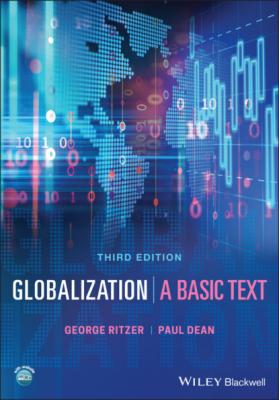Globalization. George Ritzer
Чтение книги онлайн.
Читать онлайн книгу Globalization - George Ritzer страница 25

Does Globalization Hop Rather than Flow?
If There is Such a Thing as Globalization, is it Inexorable?
Does Globaphilia or Globaphobia Have the Upper Hand?
What, if Anything, Can Be Done About Globalization?
Necessary Actions are Already UnderwayMore, Perhaps Much More, Needs to be Done
Chapter 1 presented an overarching and integrated perspective on globalization as well as at least some details on a few of its (innumerable) elements. However, we have proceeded to a large extent as if globalization in general, as well as the particular perspective on it offered here (with its focus on flows and barriers, processes and structures), is not in dispute. Indeed, the entire field of globalization studies is riddled with differences of opinion and great debates (Dean and Ritzer 2012; Ritzer and Atalay 2010; Zürn and de Wilde 2016). In this chapter we present some of these differences. The goal is to offer a more nuanced sense of globalization.
We begin with an issue that, from the tenor of the discussion in the first chapter, would appear to be a non-issue. That is the question of whether or not there is some set of developments that can legitimately be called globalization. While the prior discussion, as well as the reality of this book and its title, indicates that the answer to that question will, in the end, be in the affirmative, it is worth reviewing the debate over the very existence of globalization.
IS THERE SUCH A THING AS GLOBALIZATION?
The “great globalization debate” is between those who are skeptical about the process (the “skeptics”) and those who accept it as a reality (the “globalists”) (Held and McGrew 2000).
Globalists take the position that there is such a thing as globalization and it encompasses virtually the entirety of the globe. The skeptics contend that there is no such thing as globalization because vast portions of the globe, and a significant portion of the world’s population, are wholly, or in significant part, outside of, and even actively excluded, from the processes generally associated with it. It is argued that since the term globalization implies a truly global phenomenon, the exclusion of such a large proportion of the globe serves to deny the existence of globalization. Furthermore, to the skeptics, there are various barriers, especially those created by the nation-state and regional groups of such states, that greatly restrict, if not prevent, global flows.
Globalists respond that just because some parts of the world are relatively uninvolved does not mean that the vast majority of them are not enmeshed, often deeply, in a series of relationships that meet the definition of globalization. The globalists further argue that it is impossible, or at least nearly so, to find any part of the world totally unaffected by globalization.
The globalists tend to see a broad process of globalization, but to the skeptics there is no one process of globalization, but rather many globalizations (Therborn 2000) (there is a scholarly journal entitled Globalizations). In fact, there are even several different ways of thinking about globalizations including multiple general processes (e.g. economic, political, etc.), multiple dimensions of globalization (Gopinath 2018), as well as differences between globalization as experienced by the haves and have-nots (de Sousa Santos 2006). Thus, to the skeptics the term globalization is an oversimplification and obscures a wide array of processes that are affecting the world in many different ways.
The globalists respond by agreeing that there is much to support the argument of multiple globalization processes and hence the use of the term globalizations has much merit. However, in their view, this is simply a terminological difference and both concepts (globalization and globalizations) acknowledge the importance of globalization. Indeed, the use of the term globalization in this book generally covers both a general process as well as a multitude of sub-processes that are encompassed by it (see below).
The globalists see globalization as not only in existence today, but as growing ever more powerful and pervasive. In this view, globalization involves a set of processes that led, among many other things, to the supplanting of the nation-state as the preeminent actor in the world. In Yergin and Stanislaw’s terms, the nation-state lost (primarily to the market) the “commanding heights” it had, until recently, occupied; that loss “marks a great divide between the twentieth and twenty-first centuries” (Yergin and Stanislaw 1998: xiii). Thus, for example, once a structure is able to control its borders, the nation-state has been supplanted in importance, at least in this realm, by global flows of all sorts (Dasgupta 2018). It is those flows that are of key importance and the nation-state has grown unable (or unwilling) to stop them. While the nation-state has declined in importance in the global age, “this era is not the end of the nation-state, even less the end of government” (Yergin and Stanislaw 1998: 396).
To the skeptics, at one time there may have been a process that could have been called globalization, but it is now coming to an end (Rugman 2012) with the world entering a period of de-globalization (Link 2018). They argue that in recent years the nation-state has reasserted itself and has regained, or is regaining,